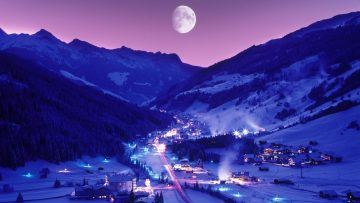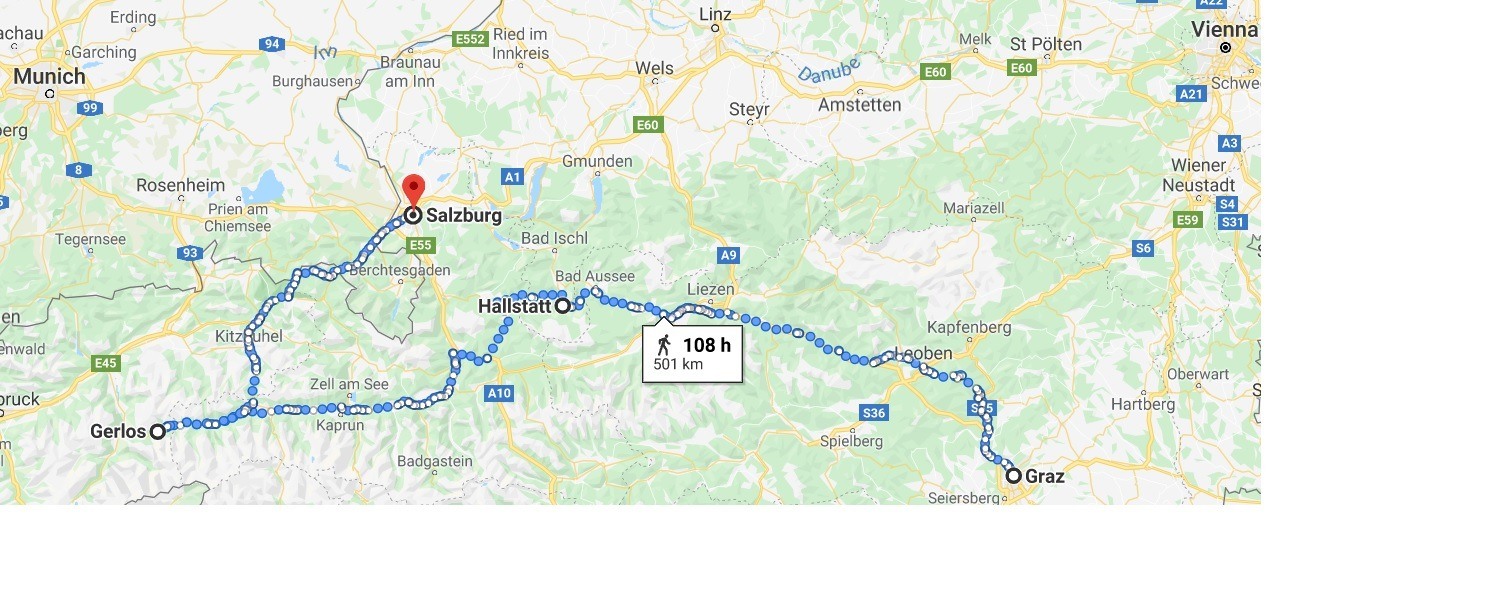by Cathy Chua

Shortly before my first trip to Austria in September, a story did the rounds of a tourist sued for leaving a review on Tripadvisor complaining of a photographic display of Nazis at a hotel in a little town called Gerlos in the Tyrolean Alps. The case has not yet ended, but for now the Austrian court has granted a temporary injunction against the tourist, in favour of the hotel.
Seeing a Nazi publicly honoured at the hotel had made K and his wife feel indignation and disgust, the post said. “This made us wonder what the hotel owners are trying to tell us with this image. This incident speaks volumes about the current state of affairs in this region of Austria. Sadly, our desire to visit this mountain region has disappeared completely.
For me this raised an issue I often find myself discussing: is the Far Right in Europe, as it presents itself at the moment, ‘new’? Being a historian, I take the long view and see the continuum. For me, what is happening isn’t new, it’s connected to the past. Far Right sympathies haven’t stopped, they have from time to time gone into hiding, or disguised themselves, but they have always been there, if not necessarily in plain sight. I hope that is full disclosure of my relevant bias.
And here is a map of the places referred to in this post. Vienna is right and near the top.
 Shortly after reading this report about the lawsuit, I found myself in Graz. The train trip from Vienna offers scenery which is straight out of The Sound of Music. A person who lives in Switzerland does not readily admit to the natural beauty of other places, I might add. It was with the movie in mind, then, that I wandered about looking at the shops and discovered that normal fashion in Graz includes traditional clothing such as the dirndl – I couldn’t get Julie Andrews out of my head. It could be seen displayed next to Sonia Rykiel and the same was so for male fashion. Hugo Boss suit side by side with lederhosen. All this at prices ranging from cheap to over 1K Euro for male and female outfits alike.
Shortly after reading this report about the lawsuit, I found myself in Graz. The train trip from Vienna offers scenery which is straight out of The Sound of Music. A person who lives in Switzerland does not readily admit to the natural beauty of other places, I might add. It was with the movie in mind, then, that I wandered about looking at the shops and discovered that normal fashion in Graz includes traditional clothing such as the dirndl – I couldn’t get Julie Andrews out of my head. It could be seen displayed next to Sonia Rykiel and the same was so for male fashion. Hugo Boss suit side by side with lederhosen. All this at prices ranging from cheap to over 1K Euro for male and female outfits alike.
It seemed in some way, in other words, that time had stood still in Graz.
I regret not having photos of what I next saw. With the election looming, there were large billboards for Sebastian Kurz everywhere. Normally political posters, if graffiti-ised, are done so to insult. Yet, Kurz posters were actually defaced for the opposite reason. ‘Sebastian for the Fatherland’. ‘Sebastian = Jesus’. Which one of these was supposed to be complimented by the equation, I wondered.
As I wandered around observing these, another question came to mind. In the defacing of political posters, the Hitler moustache is used as an extreme insult. But here in Graz? Was the scribble above Kurz’s lip was it an insult? Or the ultimate honour? I might add that in Vienna, the Financial Times reports on defacing of FPÖ posters this way which it sees as clearly anti, not pro. Fanciful on my part, I suppose, then.
The weekend before I visited Graz, the FPÖ – party of the Far Right in Austria – held a large gathering, some 800, to deal with the fallout of the scandal which had recently been so disastrous for them. It was the same weekend as that of a traditional festival in Graz celebrating the folk customs of the area. The Aufsteirern Festival was held this year on the 15th of September, the FPÖ gathering on the 14th. The newly elected Norbert Hofer says “Nobody can stop us, except ourselves….That’s what I want to change: Never again will we fail ourselves.” And then the next day, folk dancing, country food, maidenly costumes. Is there any difference, one wonders, searching the faces in the pictures, between these fresh-faced youths and those of the 1930s?
It is quickly obvious that it isn’t possible to make generalisations of this type. Graz is a ‘foodie’ destination, hipster cafes abound which would not be out of place in cooler towns. Our hotel was of this ilk and young people ran everything, as friendly as could be, nothing was too much trouble. Not a Nazi memento in sight. In the 2017 local elections in Graz, the second best performing party behind Kurz’s wasn’t the FPÖ, but the KPÖ – the Communist Party of Austria. As far as I can see this is atypical of Austria, even Vienna. The only thing becoming clear was that a simple narrative is not possible. Graz is a complex place.
Further demonstrating that, straight after the Aufsteirern Festival, celebrating the conservative traditions of the area, came the Steirischerherbst Festival, which is about contemporary art of all kinds. Australian reporter John McDonald reported
This year’s theme, devised by Russian director, Ekaterina Degot, is Volksfronten – a word that conjures up populist movements from both the left and the right. Although the term “Volk” holds memories of Nazi ideology, the idea of a people’s front is more readily associated with left-wing dreams of revolution.
The ambiguity was crucial to the festival, repeated in work after work. The director made no apologies for the nature of the performances and exhibitions. “I agree that art can be disruptive and sometimes unpleasant,” she said in her opening speech. “This is, actually, how it should be – to shatter our beliefs and to propose new visions, to destroy in order to create.” Sydney Morning Herald October 5, 2018
Greta Thunberg is credited for the swing away from the Far Right and towards the Greens in the recent Austrian national elections. Whether this sort of momentum will be maintained and with what consequence remains to be seen. But I for one will maintain a strong sense of dis-ease with how things are in Austria. Particularly on the issue of memory and connection.
Reflecting back to the case of K’s suing and counter-suing over his tripadvisor review, although it is reported that the family has taken down the photos of Nazis, it is also the case that both tripadvisor and booking.com took down the review. But what has fundamentally changed? The mindset of the hotelier has not changed, it is merely now hidden. Not all such hotel descriptions end up in court.
In 2013 on tripadvisor a Swedish visitor to Austria complained in more or less identical way about an identical situation, this time in Hallstatt. You will see in the link the photos which were displayed in the hotel as family snapshots. According to the review, an exchange of emails took place in which the hotelier concerned simply saw an Austria which had overwhelmingly wanted to be annexed by Hitler and then suffering after the war was lost. It was just history. But is it the case that this is all ancient history without connections to the present? That we can separate grandpa into two or more parts and see only part of him, even with the other staring us in the face?
It was only two years ago, at the 50th anniversary year of the steirischer herbst, that Georg Friedrich Haas spoke so movingly of the relationship of art to National Socialism. He denounced his father and grandfather as Nazis, but his own relations were but the start of it.
When the former members of the National Socialist German Worker’s Party regained their right to vote, a race for their votes ensued. In some Austrian provinces, the outcome of this race settled the power structures: The Socialist Party, SPÖ, won Carinthia and Burgenland, while the People’s Party, ÖVP, won Styria, Upper Austria and Salzburg.
The Nazis were offered jobs in the public and semi-public spheres. Wherever necessary, new posts were created.
They were back. And they went as far as they were allowed to go.
Within a couple of years, they had infiltrated parts of public life. In secret. Or, better: semi-publicly.
He went on to say, to the audience in front of him,
Had my father been sentenced to one year in prison for every time he committed the crime of Nazi re-engagement within family limits, he would have done a couple of tens of thousands of years. I am convinced that there are at least 70 persons in this room whose parents or grandparents – or maybe even they themselves –would have received a similar amount.
Government had proven powerless in the face of the Nazis.
And Austrian journalism either couldn’t or wouldn’t expose this.
The only ones who were able to talk about it were the artists. They did it using their own means. Some of them addressed it explicitly. Others implied it. That’s where the darkness, the pain, the ruthlessness have their origin.
It’s a marvellous speech which I urge everyone to read in full.
Granted it was 30 years ago, but would not many of those present at the next scene still be alive? The perpetual thorn in Austria’s side, Thomas Bernhard was asked to write a play, to be presented in Vienna on the 50th anniversary of Hitler’s annexation of Austria.
After the press got hold of the script, which included lines such as “There are more Nazis in Vienna now / than in thirty-eight,” politicians on the right, including Jörg Haider, called for the director’s expulsion from Vienna. For the première, on November 4, 1988, the Burgtheater was put under police guard. At the play’s finish, according to Bernhard’s biographer Gitta Honegger, a “dissonant ovation” of “shouting, booing, clapping, and whistling” went on for forty-five minutes.
Who was doing this shouting and booing? I’m sure Haas would say it was Nazis and sympathisers and deniers. Our persons are much influenced by our past – most particularly by our families. It is simply impossible that the Austria today isn’t part of the Austria of the past. Different parts and people of Austria have taken different messages from that past. But who is going to win? Hofer’s supporters – ‘never again will we fail ourselves’ – or the artists. Haas ended his speech in 2017:
Fascism and fundamentalism are on the rise globally. Our challenge as artists is to confront it by spreading the virus of humanity. In whichever way we try to accomplish that.
And the challenge cultural events like steirischer herbst must face is to find the next John Cage, who is capable of shaking up young fascists. And better yet, not ONE John Cage, but many John and Jane Cages.
Art v fascism. Art lost in the 1930s. Will it be able to do better now? And will Graz be the battleground?
